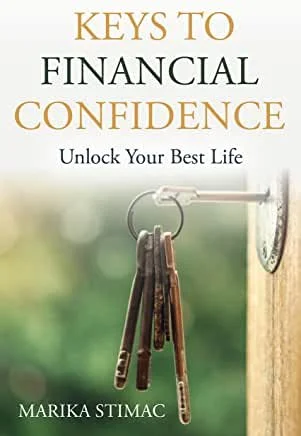Why You Need an Emergency Fund: The Key to Financial Security and Peace of Mind
Why You Need an Emergency Fund: The Key to Financial Security and Peace of Mind
Discover How an Emergency Fund Protects You from Life’s Unexpected Expenses and Helps You Stay Financially Confident
Flat tires, brake replacements, dishwasher repairs, chipped teeth, broken toilets, or seven summer weddings. You’ve probably faced at least one of these unexpected expenses in your life. While some of them—like the weddings—are known, they happen infrequently and don’t fit neatly into your regular budget. This is when you need an emergency fund—and let me tell you, EVERYONE should have one. The more financially confident you become, the more you’ll recognize that building an emergency fund is a critical step toward financial success.
But let’s be honest: Having an emergency fund isn’t always as simple as it sounds. Half the time, an emergency fund turns into an impromptu new sofa or hot tub fund. It’s easy to feel tempted by the balance of money sitting there, untouched. It feels like a safety net, so you start to think, "I’m invincible. I can afford that splurge, I know I have the funds if needed."
But here’s the deal: Emergency funds are for the situations that can put you and your budget out of alignment.They’re there to help you avoid financial stress and to make sure that when life throws a curveball, you don’t have to go into debt to fix it. They are essential for your peace of mind and overall financial confidence.
What Exactly Is an Emergency Fund?
An emergency fund is a savings buffer that is meant to cover unexpected expenses—those unforeseen costs that can throw off your financial plans and cause stress. Whether it’s your car breaking down, a sudden medical bill, or a home repair, your emergency fund acts as a financial cushion. It’s there to protect you when the unexpected happens—and trust me, it always does.
Having an emergency fund means you won’t have to panic when life’s inevitable setbacks occur. You’ll know that you have a financial safety net to fall back on. This allows you to stay calm and make rational decisions instead of scrambling for credit cards or loans.
Why You Need an Emergency Fund: The Benefits
An emergency fund isn’t just a "nice-to-have"—it’s an absolute must for anyone who wants to feel financially secure. Here are some of the key benefits:
1. Financial Security
Without an emergency fund, you’re living on the edge financially. Any unexpected event—big or small—can cause a major disruption in your life. Having an emergency fund provides a safety net that protects you from these disruptions. It allows you to deal with life’s surprises without having to rely on high-interest credit cards or loans.
2. Peace of Mind
There’s nothing worse than worrying about how you’ll pay for an unexpected expense. An emergency fund gives you peace of mind knowing that you have money set aside to handle life’s challenges. With an emergency fund, you don’t have to stress over every small financial mishap because you know you can handle it.
3. Avoiding Debt
When you don’t have an emergency fund, the natural reaction is to borrow money—either by putting the expense on a credit card, taking out a loan, or using a line of credit. This is not only stressful but also expensive, as you’ll be paying interest on top of the original amount. An emergency fund helps you avoid debt by providing a cash buffer when you need it.
4. Staying on Track with Your Financial Goals
Your financial goals—whether it’s saving for a vacation, paying off debt, or buying a home—are important. But if you don’t have an emergency fund in place, unexpected expenses can derail your progress. With an emergency fund, you’re less likely to dip into your savings or use credit cards for non-emergencies, allowing you to stay focused on your long-term financial goals.
5. Increased Financial Confidence
Once you have an emergency fund, you’ll feel more confident about your financial situation. You’ll know that you’re prepared for the unexpected, which can give you the confidence to make smart financial decisions in other areas of your life—whether it’s budgeting, investing, or taking on new financial responsibilities.
How Much Should You Have in Your Emergency Fund?
Now, the million-dollar question: How much should you have in your emergency fund?
The answer isn’t one-size-fits-all, and it really depends on your personal circumstances. But here are some general guidelines to help you determine how much you should aim for:
Three to Six Months of Expenses: The most commonly recommended amount is to save enough to cover three to six months of living expenses. This includes rent/mortgage, utilities, food, transportation, insurance, and other essential costs. Financial planners recommend this amount because it gives you enough to weather most unexpected situations, such as job loss or major home repairs.
Your Personal Situation: If you’re a homeowner versus a renter, or if you have a stable job versus a more uncertain income, your emergency fund needs may vary. If you have a family or dependents, you’ll likely want to aim for the higher end of the range to account for additional expenses.
Start Small, Build Gradually: If saving three to six months’ worth of expenses feels overwhelming, start with a smaller goal—maybe one or two months’ worth of expenses—and work your way up. Even if you start small, every little bit helps and gets you closer to financial security.
Where Should You Keep Your Emergency Fund?
Once you’ve decided on the right amount for your emergency fund, the next step is to figure out where to keep it. The goal is to have the money available when you need it but not so easily accessible that you’re tempted to dip into it for non-emergencies.
Here are some tips for where to keep your emergency fund:
High-Interest Savings Account: A high-interest savings account is one of the best places to keep your emergency fund. It’s liquid (easy to access), but it also earns some interest while you leave it untouched. Look for an account with no fees and competitive interest rates. Many online banks offer high-yield savings accounts that can help your emergency fund grow.
Money Market Accounts: A money market account is another option. It often offers higher interest rates than regular savings accounts, and it’s still a safe and accessible option for your emergency fund. Just make sure that the account is FDIC insured, so your money is protected.
Avoid Keeping It in Investment Accounts: While it might be tempting to invest your emergency fund in the stock market to try to grow it faster, don’t do it. Emergency funds need to be liquid (easy to access) and not subject to market fluctuations. The point is to have the money available in case of an emergency, not to risk it for potential gains.
Replenishing Your Emergency Fund
Once you dip into your emergency fund, it’s critical to replenish it as soon as possible. The whole point of the emergency fund is that it’s available when you need it. So after using it for an emergency, make replenishing it your top priority.
Here are some tips for replenishing your emergency fund:
Make Replenishing Your Emergency Fund a Priority: After using your emergency fund for a large expense, such as car repairs or a medical bill, focus on replenishing it. Consider cutting back on non-essential spending for a while or redirecting a portion of your income into your emergency savings.
Start Small, Be Consistent: If you can’t fully replenish your emergency fund in one go, that’s okay. Start by setting aside whatever amount you can, even if it’s just $20 or $50. The key is to be consistent and make sure you’re regularly adding to the fund until it’s back to full capacity.
Automate Your Savings: One of the best ways to consistently add to your emergency fund is by automating your savings. Set up a recurring transfer from your checking account to your high-interest savings account. Even small contributions, when automated, will add up over time.
What to Do If You Can’t Save for an Emergency Fund
If you’re finding it hard to save for an emergency fund due to a tight budget, don’t worry. Even small amounts count, and the key is to start somewhere.
Start Small: Even if you can only save $20 or $50 a month, that’s a great start. Put it into a separate savings account and watch it grow over time.
Cut Back on Non-Essential Expenses: Look for ways to reduce unnecessary spending. Are there subscriptions you’re not using? Can you cut back on dining out or impulse purchases? Redirect that money into your emergency fund.
Increase Your Income: If possible, consider finding ways to increase your income. Whether it’s through a side hustle, freelance work, or asking for a raise at your job, increasing your income can help you build your emergency fund faster.
The Power of an Emergency Fund for Financial Confidence
An emergency fund is not just a nice-to-have—it’s a critical element of financial security and peace of mind. It protects you from unexpected expenses, helps you stay financially confident, and gives you the freedom to handle life’s challenges without going into debt.
Start small, build gradually, and prioritize replenishing it when necessary. With time, you’ll find that having an emergency fund gives you a greater sense of control over your finances and a stronger foundation for your financial goals.
Coaching Questions for Reflection:
How much do you need in your emergency fund based on your current expenses and lifestyle?
What steps can you take today to start building or replenishing your emergency fund?
How can you make saving for an emergency fund a priority in your budget?
Explore More:
For more tips on managing your finances and building financial confidence, check out these related blog posts:
How to Build Intergenerational Wealth: Passing Financial Knowledge to the Next Generation
Preparing for Unexpected Financial Emergencies: How to Save $1000 Fast
Boosting Your Monthly Savings: Practical Tips for Greater Financial Security
3 Powerful Ways to Stay Accountable and Achieve Your Financial Goals
Disclaimer:
This content is for informational purposes only and not legal, financial, or tax advice. Consult a qualified professional for advice specific to your situation. The Financial Confidence Coach is not liable for actions taken based on this information.





